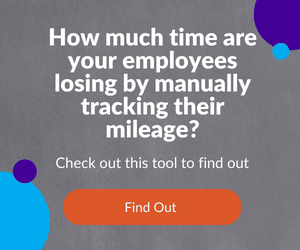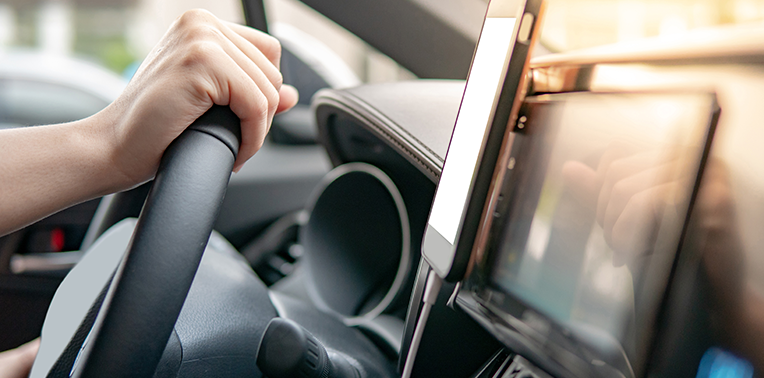Not every vehicle program requires mileage logs. For companies with fleets and car allowances, capturing business mileage may seem like busy work. However, mileage logs are more than just the foundation for mileage reimbursements. Additionally, the right business mileage tracker will save the company time and money while reducing risk. So what is a business mileage tracker? And how can they help companies control costs?
What is a business mileage tracker?
A business mileage tracker is a tool that serves a specific purpose. Companies that need driving employees to achieve business goals may implement different vehicle programs to support those employees. These vehicle programs either provide employees with vehicles or ensure they are paid for the business miles they put on their vehicles. Some vehicle programs require mileage logs of each business-related trip a driving employee makes to appropriately compensate them.
What do business mileage trackers do?
Business mileage trackers capture the business miles an employee puts on their personal vehicle. This is generally done through the GPS and motion tracking software now common in smartphones. Employees simply pull up the business mileage tracking app, select start trip and the app does the rest.
What are the benefits of business mileage tracker?
Implementing business mileage trackers across the mobile workforce can benefit both employer and employee in a number of ways. Those benefits can be broken down into three main categories: efficiency, accuracy and compliance.
Efficiency
Some companies that have yet to adopt business mileage trackers. This means employees still record these logs manually. The process of recording mileage with pen and paper may seem like simple minutes out of the day, but when it’s required at the beginning and end of every trip, those minutes add up. What’s more, when mobile workers submit those manual mileage logs, other employees have to log them, and often reach out to confirm something illegible.
Business mileage trackers remove that increased administrative burden on both ends of this process. Employees add the necessary information (if it doesn’t auto-populate), take their trip, and submit their mileage. Administrators have a much easier job looking through the digital mileage logs before approving them.
Accuracy
Mileage fraud is common in a company with manual mileage logs. It’s rarely intentionally malicious. Say you drove 12.4 miles. That’s very nearly 13 miles. With numbers so small, rounding up miles just makes sense, right? Unfortunately, that small rounding on each trip adds up over a year of business driving. Multiply it across the mobile workforce and you see a serious problem.
The right business mileage trackers record the exact mileage. No easy way to change those numbers without drawing attention. Once the mileage log has been submitted, administrators reviewing it can easily spot whether the trip submitted was business related and reimbursement eligible. The accuracy also benefits employees. It ensures they receive a fair and accurate reimbursement.
Compliance
Finally, submitted manual mileage logs often fail to meet IRS compliance standards. IRS compliant mileage logs must include the time, date, start and end location, miles traveled and business purpose of each trip. Whether a submitted log is missing information or the information submitted is wrong, the result is the same. These errors expose both driving employees and their companies to IRS audit.
With the right app, driving employees can capture the necessary information and submit IRS compliant mileage logs with ease from mobile.
Why should you use a mileage tracker app?
There are two vehicle programs where a business mileage tracker is essential: mileage reimbursement and fixed and variable rate (FAVR) reimbursement programs. However, there are also applications for a business mileage tracker in company-provided vehicle programs and car allowance programs. We’ll dive into each further.
Cents-Per-Mile
Business mileage trackers are essential to a cents-per-mile reimbursement program from a couple simple reasons. First, employees won’t receive their reimbursements unless they submit mileage logs for their business trips. Second, as previously stated, while manually recording mileage is an option, it’s time consuming and exposes the company to mileage fraud. With the right business mileage tracker, employees can deliver IRS-compliant mileage logs with ease.
Fixed and Variable Rate (FAVR) Reimbursement
While a typical mileage reimbursement can be run with manual mileage tracking, a FAVR program requires a business mileage tracker. The reasoning is simple. FAVR reimbursements are specific to each individual driving employee. With the right provider, these rates are calculated through a platform that connects business mileage trackers with the data that ensures fair and accurate mileage reimbursement. A manually-recorded process would be inefficient, taking far longer than necessary. For the convenience of both employer and employee, FAVR and business mileage trackers go hand in hand.
Car Allowance
Plenty of companies have car allowances and don’t require their driving employees to record any business mileage. However, if the allowances aren’t tied directly to business miles, the IRS considers them additional income. That makes each monthly payment taxable. Ultimately, employers pay more and employees receive less.
Through an accountable allowance program, employees capture and submit their mileage. This substantiates the allowance amount they receive, ensuring any amount they receive, up to the IRS mileage rate, is untaxed. This also protects companies from potential mileage audit risk.
Company-Provided Vehicle Programs
A company-provided vehicle program, also referred to as a fleet program, can’t possibly have need of a business mileage tracker, right? The company provides employees with vehicles they drive for business trips. Why would that mileage need to be recorded? Well, most companies offer their fleet vehicles as a perk to employees. And that is a taxable perk.
According to the IRS, “An employee’s personal use of an employer-owned automobile is considered a part of an employee’s taxable income…” So, what happens if the employee doesn’t keep a record of their business and personal miles? If that’s the case, “the IRS deems the use 100% personal to the employee.”
Employers can guarantee employees enjoy personal use of fleet vehicles tax free with a business mileage tracker. Employees can track their business miles and subtract personal mileage, or vice versa. Either option is more favorable than paying income taxes on the perk.
How To Choose a Mileage Tracker App
Choosing the right mileage tracker app requires a bit of pre-work. First, you have to answer some questions. Is this to outfit a mobile workforce? Or is this for reporting a 1099 worker’s miles? While some mileage tracker apps may strive to tackle both, they may come up short on delivering the best experience.
Now let’s dig into the features.
What business mileage tracker features matter most?
Most business mileage trackers will have a handful of these features. A smaller number will have them all. That doesn’t guarantee they deliver each feature at the same level of quality.
Automated Mileage Tracking
It should come as no surprise that mileage automation tops this list. At the end of the day, it’s one of the biggest benefits a company receives when adopting a business mileage tracker. The less amount of work an employee needs to put into capturing their miles, the better.
Accuracy
The best mileage tracking apps accurately capture trips. Seems like a given, right? Unfortunately, with some vendors, accuracy can be a cause for concern. Whether its remote locations or high-density ones, make sure the recorded mileage is 100% accurate.
Compliance
A mileage log is all but useless if it fails to meet compliance. While numbers can be fudged and important information can be forgotten with manual mileage logs, a business mileage tracker removes those issues. If the tracker allows employees to submit incomplete mileage logs, then it isn’t performing as needed.
Set and Forget
Some trackers only need one tap to capture a day of business driving. Locations, times, odometer record, all of that is logged without additional input. The app will even acknowledge when the vehicle has stopped and ended the trip. All that’s left is for the employee to add the purpose of the business trip. Mobile workers can add this information any time before submitting the mileage log. Or, if they recorded a personal trip, they can remove it.
Submission Process
Submitting mileage logs with a business mileage tracker should be a breeze. Once all the information has been added correctly, with the best tracker, a mobile worker can submit the mileage log from anywhere. The digital, easy-to-read version of that log should arrive, ready to be reviewed and approved for reimbursement. While low on this list of features that matter, this might as well be an essential. A business mileage tracker that doesn’t easily submit mileage logs isn’t worth considering.
Battery Drain
Keep any application on your phone open for long enough and you’re going to start worrying about the battery. What good is a business mileage tracker when your phone is dead? Whether the charging cable stopped working, or it simply disappeared from the car, you shouldn’t have to worry about your phone’s battery life. With the best mileage tracker app, you don’t have to.
Adjustable
Can you imagine if a business mileage tracker app captured every single trip? Sometimes mobile workers simply forget to turn them off. There’s no harm in capturing personal trips. Those can easily be deleted before submission. But there’s an even easier solution. With the best mileage tracking app, companies can set their working hours. That lets the app know when the trip is likely personal or for business.
The Motus Solution
It may come as no surprise to you that the Motus app is a core part of our vehicle reimbursement solutions. This app works hand in hand with the Motus platform to ensure the accuracy of each mileage log and reimbursement. So what are the features of the Motus App? Where does it stand in terms of the best mileage tracker? Let’s have a look at some information complied by G2.
| Ratings | Motus | Top Competitors |
| Ease of Use | 9.3 | 9.0 |
| Ease of Setup | 9.4 | 9.1 |
| Tracking Mileage | 9.2 | 8.9 |
| Automation | 9.0 | 8.9 |
| Policy Compliance Management | 9.7 | 8.1 |
You can check out what users and administrators have to say about the Motus App on G2. Interested in learning more about the Motus app? Take a tour of our app today!









